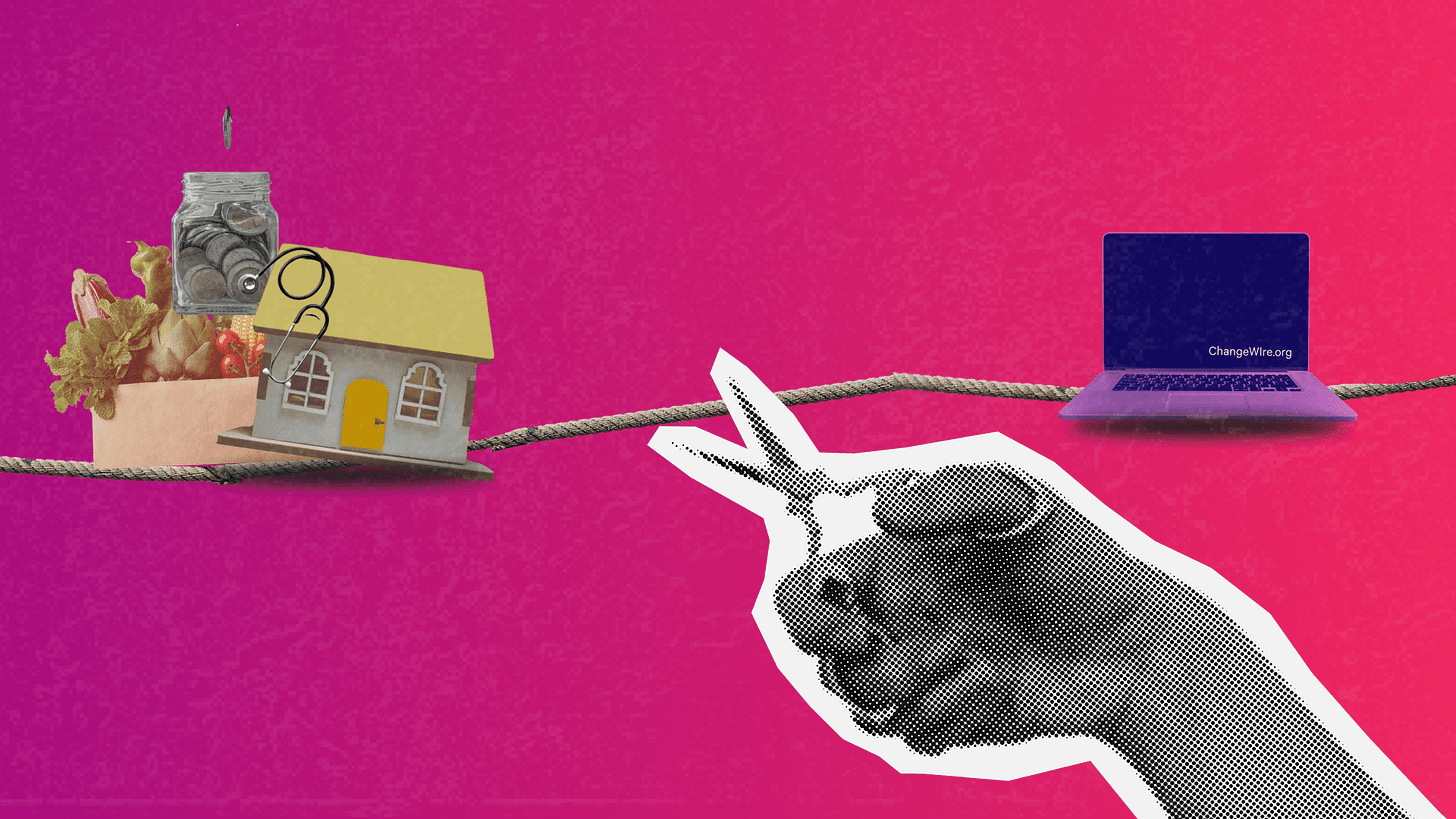The Balancing Act of Making Ends Meet
Our communities depend on the safety net—but the GOP’s cuts will jeopardize their lifelines
Safety net programs such as SNAP, Medicaid, HUD housing vouchers, LIHEAP energy assistance, and others can be both life-changing and life-saving. And when life-saving programs are squeezed or cut altogether, the consequences can be life-threatening.
When you can’t afford heat, for example, having support to pay your heating bills can keep you from freezing. Likewise, having a roof over your head ensures that you can continue to build on your financial goals, stay healthy, and contribute to your community. For people who fall near or below the federal poverty line, safety net programs provide the support people need to become stable and, in most cases, pass that stability on to their children.
Navigating the requirements of most safety net programs, however, can often be a nightmare. As Safety Net fellow, Bobbi Dempsey, reveals in her article, it can be a tightrope act to sort out the requirements of any given program and to ensure that your income doesn’t ever go over even by a small amount. For people who have jobs with fluctuating hours, or for gig workers whose hours can be very inconsistent, qualifying for a program like Medicaid can fluctuate—with no regard for how out-of-reach a person’s life-saving medication might be without coverage.
As the current administration continues its attacks on these vital safety net programs, it’s more important than ever to advocate to not only preserve these programs, but make them easier to navigate. It’s an uphill battle but one worth fighting, because the wellbeing of our community members affects all of us.
Beyond the Byline with Bobbi Dempsey
EW: In what ways have you benefited from safety net programs and why are they so important?
I grew up in severe poverty, so my family relied on a variety of safety net programs—primarily SNAP (then known as food stamps) and the free lunch program—for my entire childhood. More recently, my children received health insurance through our state’s CHIP program [low-cost health insurance for kids whose families earn too much to qualify for Medicaid] prior to the passing of the Affordable Care Act. Today, many members of my extended family rely on SNAP and Medicaid. These programs are so important because they help some of the most vulnerable people take care of their basic needs like food and shelter.
EW: What myths and misconceptions have you encountered regarding safety net programs and why is it important to share accurate information and real-life personal stories about these programs?
One of the most prevalent stereotypes is that anyone who participates in a program like SNAP or Medicaid must be lazy and just wants to “game the system.” In reality, a significant number of SNAP households with non-disabled, working-age adults have earned income. Many people enrolled in safety net programs who are physically able to work do have at least a part-time job or are currently seeking employment. I think it’s important to share real-life personal stories because this can help dispel some of the common myths about these programs. Also, it’s easier to have empathy and compassion for someone once you know their story, and putting a human face on these programs helps outside observers realize that there are likely people with whom they have much in common that depend on these programs to survive.
EW: Is there an example or story you can share that illustrates the life-changing impact of having access to accurate information about safety net programs?
Over the years, I’ve heard from numerous people who didn’t realize they were eligible for certain programs such as SNAP or Medicaid, or who had been given incorrect information that led them to miss out on benefits to which they were rightfully entitled. The rules for these programs can be confusing and complex—and eligibility requirements can often change and may vary widely from one state to the next, such as we saw when the ACA was passed and some states did the Medicaid expansion and others didn’t. Providing accurate information in an accessible and easy-to-understand way helps ensure that safety net programs support people who need this help the most.
EW: What advice would you give to people who feel overwhelmed by navigating various safety net programs as they exist currently?
I wish I could be more optimistic, but unfortunately things aren’t going to improve on that front—and are likely going to get much worse. As staffing and resources for many agencies and programs are cut, this will inevitably mean longer wait times and more difficulty in reaching someone at those offices who can help you. I would advise anyone currently participating in or planning to apply for any safety net programs to review all of the eligibility requirements carefully. Be sure to meet any deadlines and make sure you complete all forms and supply all requested documentation, as forgetting even one item could lead to delays or perhaps even cause your application to be rejected. If there are any organizations in your community that assist with navigating these programs, reach out to them. Also, if you believe you’ve been treated unfairly or run into obstacles, you can also try reaching out to your lawmakers at the state and federal level, as they often have staffers who assist constituents with issues related to these programs.
EW: What do you dream of when you think about a society that meets everyone's needs?
This doesn’t seem like it should be such an ambitious, far-fetched dream, but I envision a society that supports everyone in meeting their core basic needs—things like food, shelter, and medical care. I don’t think that’s too much to ask. Importantly, that society should also be accessible and equitable so that everyone can receive the support they need without navigating a complex system or running through a gauntlet of challenges and obstacles.
Editor’s Picks
ChangeWire fellow Natasha Bailey’s video weaves her family history and life story with an understanding of the way family recipes inform her strength and her passion for cooking for others. Throughout her experiences with racism and other struggles, Bailey has carried her grandfather’s lessons and recipes with her as she worked to become a chef, raise a family, and feed her community.
In her reporting on childcare, ChangeWire fellow Val Weisler reveals a discrepancy in how childcare providers are treated across class lines. Interviews with three caregivers reflect a pattern of racism, mistreatment, and unreasonable expectations from wealthy families prone to seeing the people caring for their children as a service rather than as humans deserving of dignity and fair pay.
If you are struggling with knowing how to respond or what is actually making a difference right now, you are not alone. As ChangeWire fellow Terrance Sullivan writes in his article, organizing is not a one-time event but a continued commitment to creating lasting change. History has proven this time and again.
ICYMI
Former ChangeWire fellow Amina Jinadu interviews three experts about two key reasons so many low-income and underserved communities struggle financially. Jinadu discovers that student loan debt disproportionately affects Black college graduates, and credit scores count credit card payments, mortgages, and car loans to determine a person’s financial trustworthiness—rather than timely rent and utilities payments. Financial literacy classes and universal basic income are two ways experts recommend addressing gaps for people who have been previously denied information about how to achieve financial stability.
Alumni Corner
In an essay for The Nation, former ChangeWire fellow Darryl Lorenzo Wellington writes about how the rising cost of housing in Santa Fe left him nearly homeless. Like many other cities across the U.S., Santa Fe prides itself on the arts and culture that draw so many visitors each year—and yet, as Wellington writes, artists are being priced out. Not only that, but renters everywhere are losing their rights and agency as finding any housing at all becomes a priority over safety and fair rent prices.







